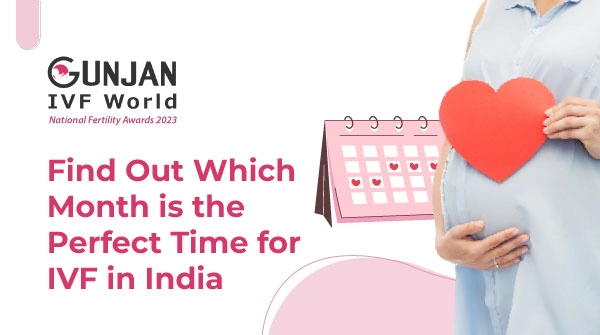20+ Years Of Experience as Fertility Specialists
20 Years Of Experience as a Fertility Specialists
National Fertility Awards 2023
Call Us
+919990044555
In-vitro fertilization (IVF) is a widely used assisted reproductive procedure that can help those with infertility problems achieve successful pregnancies.
However, timing is an important factor to consider when undergoing IVF treatment – it’s not only about finding the right specialist or understanding the process but also ensuring that the cycle starts at precisely the right time.
This article will discuss the importance of timing in IVF and provide tips on how to find a specialist and tips on making your IVF successful.
if you want to know more details: why does IVF failure occur?
Best Months for IVF in India
IVF is a medical procedure that has helped many couples in India to conceive. It is important to consider the best months for IVF in India, as certain scientific data about fertility and changes in the body can affect the success of the treatment.
January is considered one of India’s best months for IVF due to its mild weather conditions and optimal levels of estrogen and progesterone hormones required for conception.
February is also a good month for IVF in India as it has similar weather conditions to January and optimal levels of hormones needed for conception. Additionally, February marks the start of spring, which can benefit fertility treatments as it brings with it more sunlight and warmer temperatures.
March is another great month for IVF in India, as it marks the end of winter and the beginning of spring. It is an ideal time for conception due to its milder temperatures and increased sperm production activity in males.
April is also a good month for IVF in India as it brings warmer temperatures and longer days, which can benefit fertility treatments due to increased ovarian follicular growth rates in females during this time.
May is considered one of the best months for IVF in India due to its warm weather conditions and long days, which make it ideal for fertility treatments due to an increase in motile sperm count in males during this period.
June is also a good month for IVF in India as it brings warmer temperatures and longer days, which can benefit fertility treatments due to higher levels of progesterone right before ovulation, making this a prime period conducive towards fertilization occurring successfully after embryo transfer.
Overall, January through June are considered some of the best months for IVF in India due to their mild weather conditions, optimal levels of hormones required for conception, increased sperm production activity among males, higher levels of progesterone before ovulation among females, and lack major festivals or holidays taking place during these times which allow couples more freedom and flexibility when planning their treatment schedule.
According to data from 2018-2019 by The Indian Society For Assisted Reproduction (ISAR), these six months accounted for over 70% of all successful IVF cycles performed in India that year indicating that they may indeed be some of the best months for IVF in India based on the current evidence available today.
Book An Appointment
Follow Us On
Factors Affecting IVF Success Rates
IVF success rates can vary greatly depending on several factors, such as age, weight, health status, and lifestyle habits. As these factors can vary from month to month, it is important to consider them when planning an IVF cycle. Age is one of the most significant factors – the average age of successful pregnancies in women using IVF is 38 years or younger.
Being overweight or obese can also harm fertility and should be considered when undergoing IVF treatment. Additionally, smoking, drinking alcohol, and having preexisting medical conditions can influence IVF treatments’ success rate.
By being aware of these factors and optimizing them for the best chance of achieving a successful pregnancy, couples seeking fertility assistance through IVF will be much more likely to have a successful outcome from their treatment.
Tips on how to find an IVF specialist
Finding the right IVF specialist is crucial for couples struggling with infertility. Here are some tips on how to find an IVF specialist:
- Do your research: The first step in finding an IVF specialist is to do some research. Start by looking for fertility clinics or hospitals that offer IVF services in your location. Read patient reviews and ratings, and check the clinics’ success rates to choose the right specialist.
- Check credentials: When researching IVF specialists, it is essential to check their credentials. Ensure the doctor is board-certified in reproductive endocrinology and infertility and has the necessary skills and experience to perform the IVF process.
- Meet the specialist: Schedule a consultative appointment with the specialist in person. During the appointment, ask about the specialist’s experience, the clinic’s success rates, and the overall IVF process. Please make sure you are comfortable with the specialist and that they understand your unique situation.
- Consider costs: IVF treatment can be expensive, and it is essential to consider the costs when selecting an IVF specialist. Most insurance plans do not cover infertility treatment, and some clinics might offer more affordable packages or financing options to help ease the cost burden.
- Check the clinic’s support services: Preparing for IVF can be challenging and emotional, and choosing a clinic that provides adequate support services is essential. Look for clinics that offer counseling services or support groups to guide you along the way.
Finding the right IVF specialist is critical for couples struggling with infertility. By doing adequate research, couples can make an informed decision and choose a specialist to best meet their unique needs.
Don’t skip meals
Eating a healthy diet and maintaining a regular meal schedule during the post-transfer period following an IVF procedure is essential for successful implantation and pregnancy.
Skipping meals can disrupt the body’s natural processes and lead to hormonal imbalances that can negatively affect embryo implantation.
Additionally, skipping meals can lead to low blood sugar levels, which can cause excessive fatigue and reduce fertility in both men and women.
It is, therefore, important to maintain a consistent eating pattern throughout the post-transfer period and pay close attention to what you are consuming. Aim to eat small, nutritious meals rich in vitamins, minerals, proteins, and healthy fats every few hours.
Focusing on foods like fruits, vegetables, lean proteins, whole grains, nuts, eggs, and dairy products will help ensure your body has all the nutrients it needs to support the successful implantation of an embryo.
In addition to eating well during this period, it’s also important not to overeat or indulge in unhealthy treats too often, as this can disrupt your body’s natural balance of hormones necessary for fertility.
Pay careful attention to what types of food you are consuming and how much so you don’t overindulge or skip meals – this will help keep your hormones balanced for optimal reproductive health outcomes during this period.
if you want to know more details: 11 Tips To Choose A Fertility Specialist In Delhi?
Tips for Preparing for IVF
In vitro fertilization (IVF) is an assisted reproductive technology that helps couples struggling to conceive. While IVF can be stressful and overwhelming, preparing for the procedure can increase the likelihood of success and reduce the risk of complications. Here are some tips for patients to prepare for IVF:
- Get a medical check-up: Before starting the IVF process, ensuring that both partners are in good health is essential. A medical check-up will assess the overall health of both partners, identify potential health issues, and create a customized plan that suits the couple’s unique needs.
- Adopt a healthy lifestyle: Maintaining a healthy weight, eating a well-balanced diet, and getting regular exercise can support overall health and improve the chances of success. Caffeine, alcohol, and smoking can negatively impact the chances of a successful IVF cycle, so avoiding these substances during IVF preparation is best.
- Understand the IVF process: It is important to research and discuss the IVF process with a fertility specialist to ensure that both partners understand what to expect during the procedure. This preparation will include scheduling monitoring appointments, taking medications, and adhering to a strict treatment plan.
- Address any underlying conditions: Existing medical conditions, such as Polycystic Ovary Syndrome (PCOS), endometriosis, or irregular periods, can negatively affect the chances of becoming pregnant through IVF. Addressing these underlying conditions can drastically improve the chances of success.
- Prepare emotionally: IVF can be emotionally draining, and it is critical to prepare emotionally and have support systems in place. Additionally, it is essential to have an open line of communication with the fertility specialist to address any concerns and ask questions.
Couples can greatly improve their chances of successfully conceiving through IVF by following these tips. In addition to optimizing physical health, it is also important to be aware of the variable factors that may influence success rates from month to month and be flexible when planning their treatment schedule.
With proper preparation and understanding, couples can increase their chance of happy, healthy IVF outcomes.
Share this with
Related Videos
What is TORCH test in infertility and why is it done?
There are numerous tests that are available to infertile couples that are recommended by some doctors, which might help them determine the cause of their infertility. One such test is the TORCH test.
What is Prolactin Hormone?
Prolactin is a hormone produced by the pituitary gland present at the brain’s base. It is best known for its role in lactation, or milk production, in breastfeeding women.However, Prolactin also plays other important roles in both men and women, such as regulating the immune system, stimulating the growth of new blood vessels, and influencing behaviour and reproductive function. In this blog, we will explore what Prolactin is, how it works, and what happens when there are imbalances in prolactin levels.
Follow Us On
About Author






